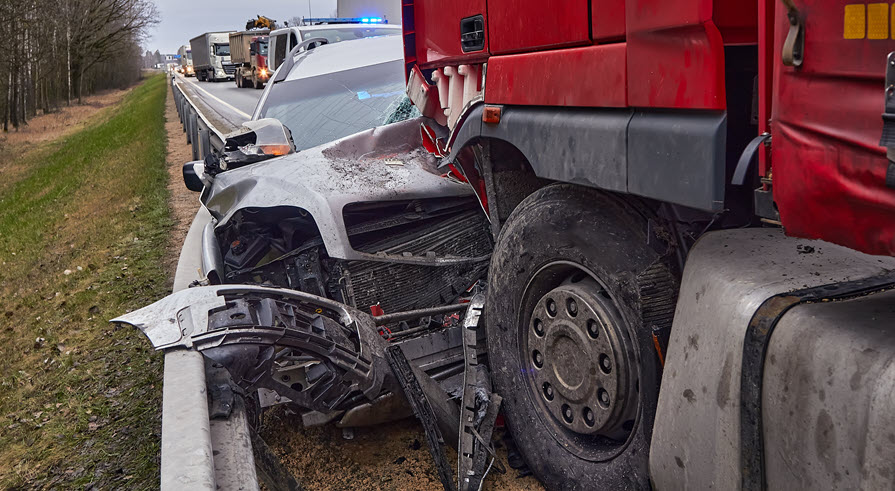What Is the Average Settlement for an 18-Wheeler Accident in Texas?
If you or a loved one has been involved in a devastating 18-wheeler accident in Texas, one of the first questions on your mind is likely: “What is my case worth?”
You may have seen stories online of multi-million dollar verdicts and wondered if your case is similar. You might be searching for an “average settlement” figure to know what to expect.
Let’s be direct: There is no “average” settlement for an 18-wheeler accident in Texas.
This isn’t a “lawyer answer” designed to be vague. It’s the truth. Every single case is unique. A case involving minor whiplash might settle for $20,000, while a case involving a catastrophic spinal cord injury could result in a $20 million verdict. Averaging these two numbers gives you a meaningless figure that has no bearing on your specific situation.
A better question to ask is: “What factors determine the value of my 18-wheeler accident case?”
This article will break down the precise factors that insurance companies and juries use to calculate the value of a claim, why truck accident cases are different, and what you can do to protect your right to full compensation.
Why Online Settlement Calculators Are Dangerously Misleading
You may have encountered “truck accident settlement calculators” online. Be cautious: these tools are often marketing gimmicks. They cannot understand the nuances of your pain, the full extent of your future medical needs, or the specific details of liability in your Texas crash.
A settlement is not determined by a simple formula. It is determined by damages and liability.
The Key Factors That Determine Your Texas Truck Accident Settlement Value
The value of your claim is built by stacking several types of “damages” (losses) on top of each other. Here are the most critical factors a lawyer will analyze.
1. The Severity of Your Injuries (Medical Damages)
This is the most significant factor. The more severe and permanent the injury, the higher the case value. This category is split into two parts:
- Past Medical Expenses: This is the total of every bill you have received since the crash. This includes the ambulance ride, emergency room visit, hospital stay, surgeries, doctor’s appointments, and prescription medications.
- Future Medical Expenses: This is often the largest part of a settlement. If your injury is permanent or requires long-term care, your attorney will hire medical and “life care plan” experts to calculate the cost of all future needs. This can include:
- Future surgeries or joint replacements
- Ongoing physical therapy
- In-home nursing care
- Modifications to your home or vehicle (e.g., wheelchair ramps)
- Prosthetics
- Chronic pain management
A case involving a traumatic brain injury (TBI) or paralysis will be valued exponentially higher than a case with a simple broken arm because the future medical costs are so immense.
2. Lost Wages and Loss of Earning Capacity
How has this accident affected your ability to work? Like medical damages, this is also split into two parts:
- Lost Wages: This is the income you have already lost from being unable to work during your recovery. This is easy to calculate.
- Loss of Future Earning Capacity: This is a more complex and high-value calculation. If your injury prevents you from returning to your old job, or if you can only work part-time, you are entitled to compensation for that lost potential income. An economic expert may be hired to calculate what you would have earned over the rest of your career versus what you can earn now.
3. Pain and Suffering (Non-Economic Damages)
This is compensation for the non-financial, human cost of the accident. It is the most subjective factor and where an experienced lawyer makes the biggest difference.
In Texas, this includes:
- Physical Pain: The actual, physical hurt you have endured and will continue to endure.
- Mental Anguish: The emotional toll, including depression, anxiety, PTSD, or fear of driving.
- Disfigurement: Compensation for permanent scarring, burns, or amputations.
- Physical Impairment: Loss of ability to do things you once enjoyed (e.g., playing with your children, hobbies, sports).
- Loss of Consortium: A claim your spouse can make for the loss of your companionship and a normal marital relationship.
There is no “calculator” for this. It is often determined by a jury based on the story of your life after the accident, or by a “multiplier” method (e.g., total medical bills multiplied by a number from 1.5 to 5, depending on severity).
4. Liability and the “Texas 51% Rule”
This is a critical, Texas-specific factor. Texas follows a “modified comparative fault” rule, also known as the 51% Bar Rule.
- What it means: The amount of compensation you can receive is reduced by your percentage of fault.
- Example: If you are awarded $1,000,000 but the jury finds you were 20% at fault (perhaps you were speeding slightly), your award is reduced by 20% ($200,000), and you receive $800,000.
- The 51% Bar: If you are found to be 51% or more at fault for the accident, you are barred from recovering any money at all.
Trucking companies are experts at trying to shift blame onto the victim to reduce or eliminate their payout. This is why a thorough investigation to prove the truck driver was 100% at fault is essential.
5. Punitive Damages (Gross Negligence)
In some rare cases, a jury may award “punitive damages.” These are not meant to compensate you for your losses, but to punish the trucking company for extreme, reckless behavior and to deter them from doing it again.
Examples of gross negligence that might lead to punitive damages in Texas include:
- The truck driver was drunk or high on drugs (DWI).
- The trucking company knew the driver had a history of reckless driving and hired them anyway.
- The company intentionally falsified driver logs to force them to drive over the legal hours-of-service limits.
Punitive damages can be very high but are heavily restricted by Texas law.
Why 18-Wheeler Cases Are Worth More Than Car Accidents
There are three main reasons why 18-wheeler settlements are typically much higher than standard car-on-car accident settlements:
- Catastrophic Injuries: The sheer physics are undeniable. A 4,000-pound car is no match for a fully loaded, 80,000-pound tractor-trailer. The injuries are almost always more severe, leading to higher medical bills and more pain and suffering.
- Higher Insurance Policies: Federal law (from the FMCSA) mandates that commercial trucks carry much higher insurance policies than passenger cars. While a Texas driver might only have $30,000 in liability coverage, a trucking company is often required to have $750,000 to $1,000,000 (or more) in coverage.
- Multiple Liable Parties: In a car crash, you usually only sue the other driver. In a trucking case, your lawyer may be able to file claims against:
- The Truck Driver
- The Trucking Company (for negligent hiring or maintenance)
- The Cargo Loader (if the truck was improperly loaded)
- The Truck Manufacturer (if a part like brakes failed)
So, What Is Your Texas Truck Accident Case Really Worth?
The only way to get a realistic estimate of your case’s value is to speak with a qualified Texas truck accident lawyer.
An experienced attorney will conduct a free, confidential case review. They will:
- Listen to your story.
- Review your medical records and police reports.
- Launch an investigation to secure evidence (like the truck’s “black box” data).
- Hire the necessary experts (medical, economic) to calculate the full value of your claim.
Do not trust an insurance adjuster to tell you what your case is worth. Their job is to pay you as little as possible, as quickly as possible.
Frequently Asked Questions (FAQ)
Q: How long will my truck accident settlement take in Texas? A: It depends on the complexity. A simple case with clear liability and minor injuries might settle in 6-9 months. A complex case involving severe injuries and a legal fight over liability could take 2-3 years or more, especially if it goes to trial. Be wary of any lawyer who promises a “quick” settlement.
Q: Do I have to pay taxes on my truck accident settlement in Texas? A: In most cases, no. According to the IRS, compensation received for personal physical injuries or physical sickness is not considered taxable income. This applies to your medical bills, lost wages, and pain and suffering. However, the portion of a settlement for punitive damages is generally taxable. You should always consult with a tax professional.
Q: What if the truck driver was an “independent contractor”? A: Trucking companies often use this as a legal defense to avoid liability, claiming they are not responsible for the driver’s actions. An experienced attorney knows how to fight this. They can often prove that the company exercised enough control over the driver (e.g., dictating routes, schedules, and equipment) that they were an “employee” in the eyes of the law.
Q: Should I accept the insurance company’s first settlement offer? A: Almost never. The first offer is almost always a “lowball” offer made before you even know the full extent of your injuries. They want you to take a small amount of quick cash and sign away your right to future compensation. Never sign anything without speaking to a lawyer first.
(Conclusion): While there is no “average settlement for an 18-wheeler accident in Texas,” there is a clear process for determining a full and fair value. It involves a detailed investigation of your injuries, your financial losses, and the truck driver’s negligence.
The most important step you can take is to focus on your recovery and contact an experienced Texas truck accident attorney to handle the legal complexities for you.
(Disclaimer: This article is for informational purposes only. It does not constitute legal advice or create an attorney-client relationship. Please consult with a qualified Texas attorney for advice on your individual situation.)




